#frank herbert's spice world
Explore tagged Tumblr posts
Text

“And what is it you do to the face of Arrakis that must not be seen?” “We change it ... slowly but with certainty ... to make it fit for human life. Our generation will not see it, nor our children nor our children’s children nor the grandchildren of their children ... but it will come.” Stilgar stared with veiled eyes out over the basin. “Open water and tall green plants and people walking freely without stillsuits.”
#arrakis#stilgar#future#it is sad that Stilgar and the Fremen around him have never seen Arrakis transformed into a green and temperate world#sandworms - spice - or plants ...#dream#fictional illustration#quote#DUNE#frank herbert#my art#fanart
28 notes
·
View notes
Text
Writing Notes: Fictional Culture
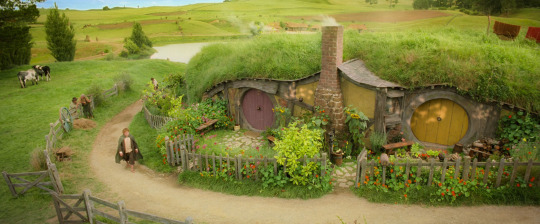
Fictional culture - an essential piece of worldbuilding in certain genres of fiction—particularly in science fiction and fantasy.
Storytellers develop fictional cultures in a variety of mediums, including film, television, short stories, novels, and video games.
A fictional culture is defined by the customs, languages, values, and symbols of an imaginary world.
How to Create a Fictional Culture
Although there are nearly endless possibilities, consider some of these general writing tips for creating a fictional culture.
Pull inspiration from the real world. Pay attention to the cultural behaviors within your society. Broaden your own cultural perspective by researching the ideas and values of different cultures throughout history. Use real-life cultural examples to inform your fictional world, but be wary of repurposing existing cultures or perpetuating stereotypes.
Build off your main character. Develop the setting of your story based on how it serves the character development of your protagonist. Build a culture that highlights or contradicts your main character’s goals, needs, and fears.
Develop a belief system. Consider the core values, social norms, and taboos of your fictional culture. A central belief system can guide how you create rituals, symbols, and artifacts within your story.
Create a social structure. Develop how the family structures and social hierarchies work within your fictional culture. Decide where your main character falls within the social structure. Monetary systems can change your social structure depending on whether you use a bartering economy or something more complex.
Construct a technological system. Determine how advanced the technology is in your fictional culture. The technology of your story will impact the entertainment, communication, and modes of transportation within your fictional world.
Write a brief history. Expand your culture by writing a brief mythology of your fictional society. Avoid overwriting, and keep your history contained to important information that can impact your story.
Examples of Fictional Cultures
To learn more about how fictional cultures work in fiction, explore the following examples.
The Lord of the Rings by J.R.R. Tolkien (1954): Tolkien created a wide variety of fictional cultures to inhabit Middle-earth. Each culture has its own language, value system, and history.
Brave New World by Aldous Huxley (1932): In his dystopian novel, Aldous Huxley developed a complex and technologically advanced culture with distinct social classes.
Dune by Frank Herbert (1965): Dune is an influential sci-fi novel with several detailed fictional cultures. One of them is the Fremen culture, which revolves around ancient superstitions and a rare commodity known as the Spice Melange.
The Fifth Season by N. K. Jemisin (2015): In this award-winning novel, Jemisin created a complex social structure with many "use-castes” that all have a place on an earthquake-ridden planet with one supercontinent.
Source ⚜ More: Notes & References ⚜ Writing Resources PDFs
#culture#worldbuilding#writing tips#writeblr#literature#writers on tumblr#writing reference#dark academia#spilled ink#writing prompt#writing advice#light academia#on writing#writing inspiration#writing ideas#creative writing#writing resources
414 notes
·
View notes
Text
Relic - Pt. 5 "Prometheus"
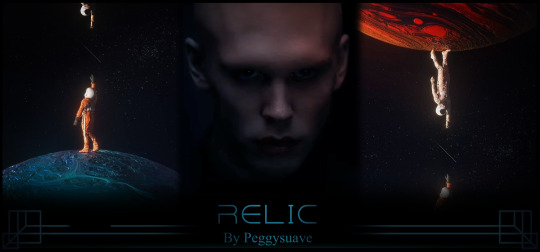
PAIRING: Feyd-Rautha Harkonnen x Unnamed Ambiguous FMC
SUMMARY: ✧༺༻ Dreams are messages from the deep ༺༻✧ A woman from the unknown comes to Feyd in his dreams and his nights become his days as he flees to the dreamscape to escape the nightmares that haunt his waking hours.
TAGS: 18+, smut, she/her AFAB FMC, vaginal sex, vaginal fingering, oral sex, Porn with Plot, Feyd-Rautha's black cum, Feyd-Rautha's big cock, Praise Kink, Body Worship, angst/hurt and comfort, drama, fluff, Frank Herbert would frown, some politics, implied/referenced (child) abuse ❗, Trauma, mentions of suicidal thoughts ❗, Healing, Strangers to Lovers, falling in love, Vulnerable!Feyd, Emotional!Feyd, Possessive!Feyd, Feyd is a sweet baby who did nothing wrong and I WILL pamper him, nurture not nature, Stockholm Syndrome but in a consensual way, lucid dreaming, implied/referenced cannibalism ❗, implied/referenced murder
WORD COUNT: 3.4k
Reposted from my Ao3 💕| Masterlist | Relic Masterlist
Dividers by @saradika-graphics
← Previous Chapter, Next Chapter →

Giedi Prime, 2 years later - 10,190 BG
He feels so-
hopeless,
broken.
One should think he has long accepted that there is no one up there in the universe to come and save him.
No one to soothe him at night, in his dreams, after he threw up upon being summoned to quench the Baron's appetite for power, even though Feyd-Rautha's physical appearance no longer meets his tastes.
But Feyd still goes to sleep every night with childish, foolish, laughable hope, only for regular nightmares to taunt him with their sticky embrace.
When he first stopped dreaming, he threw a tantrum, not telling anyone what riddled him. He was given slave warriors to kill and new blades to blunt on human bones. Under the pretense of a training injury, Feyd had ordered the Suk Doctor to examine him, pointing him towards his brain, secretly expecting a hole there, thinking his brain might have devoured itself because he doesn't deserve goodness.
But the Suk declared, there was nothing wrong with him. Nothing aside from the usual, all the invisible things that made him rot from inside.
After a week of lonely nights, he started taking spice before sleeping, knowing that the drug opens the mind, if to prescience then maybe to shared dreams as well. And it worked! Or so he thought the first night when he found a soft hand in his and the kindest voice among all of the stars whispering: "Look, doesn't this remind you of something?"
Every time he tries to speak then, he wakes up screaming, tangled in sweat-soaked sheets that smelled like cinnamon, before he can ask any of the burning questions or say what's been tearing his heart apart. His greatest regret is that he never said I love you back.
Eventually, he comes to a numbing conclusion. That is not his beloved. That is just a memory of her.
He had to stop ingesting when his sclerae became sullied with a tint of blue that bleeds into the irises. That was one year ago.
After the spice came a phase of intense studies in the bowels of Giedi Prime's archives, ignoring the admittedly quite interesting fact that centuries of his own House's history are obliterated and nowhere to be found.
Feyd learned that 23,500 years ago, in the year 13,402 BG, a strike by an asteroid devastated Old Earth, the birthplace of humankind, making it uninhabitable until it was re-seeded with plant and animal life 42 years later and became a natural park, for humans too.
In 200 BG, 10,400 years ago, Earth was once again rendered uninhabitable for centuries by atomics during the Butlerian Jihad which obliterated all thinking machines.
The first Zensunni wanderers, nowadays known as Fremen, are said to have originated from Old Earth and at some point fled in a grand exodus from planet to planet.
How does this information still exist, but not the location of the cradle of mankind among the stars? There are no more recent records. Humankind has spread itself so thin across the universe, the world of their origin has become naught but a fairytale.
Tonight, Feyd smiles at himself in the mirror in his room, trying to curl up the corners of his mouth like he used to, when a bed of white marble with blue pillows occupied by his woman was waiting for him and a fern was rustling in a terracotta pot. But his cheeks won't grow as round as they used to and Feyd despises how he looks and how his eyes stare back at him like frosty marbles, how his face looks like a gaunt skull with no life in it.
The lonely, demonic creature who stares back at him in the bleak mirror is denied access to the dream land and left to rot in his body, in his flesh prison.
Why does he still look at himself in the mirror every night and go to sleep with a tummy ache, only to wake up hollow and like his soul has been carved out of his chest and wonder:
Is she dead?
If she's dead, then what's the point?
Unconsciously he knows what he keeps searching for in the mirror. For any signs that he was ever lovable, or if his worst fears are true, that she abandoned him by choice.
There is no proof that Old Earth is not still out there, still inhabited by humans who may be unaware of how mankind has branched out across the galaxies.
On the other hand, there is also no proof that Feyd's woman has ever been real.
Among the stars
Tell me where you are. Tell me where you are. Tell me where you are.
"I am… here!"
Wallach IX, 10,190 BG
Around a heavy, wooden roundtable are gathered the Reverend Mother Gaius Helen Mohiam, flanked by the Bene Gesserit sisters Miriam and Sylvia, the Princess Irulan in place of the Padishah Emperor Shaddam Corrino IV, a face dancer named Thomin to represent the Bene Tleilax and Gwyn from Ix.
"If you can't stop behaving like animals, this discussion will never find an end!" The Princess Irulan's voice bristles in a way that makes Miriam and Sylvia scoff internally at their fellow Bene Gesserit. Thomin and Gwyn are by Bene Gesserit definition, in fact, animals.
The sun on Wallach IX stands already low above the hills and cascades hazy slants of light into the private conference chamber.
"I simply don't trust gifts from the sisterhood," Thomin smiles coldly, spindly fingers folded on the table.
"She is surprisingly useless," the Reverend Mother replies with equal coldness, gazing through the dark mesh of veil. "Why would we keep her?"
"I must insist on the historical value!" Irulan chides.
"Useless for us, Irulan."
Irulan knows her former teacher doesn't actually intend to hand the woman over to the Bene Tleilax for genetic horrors, so it is really only between her and Gwyn from Ix.
"Well, as a historian, I have undoubtedly the biggest use for her among the honorable attendees."
"I strongly object," says Gwyn. "Her technological knowledge could prove invaluable to us!"
Thomin chimes in. "Her genetic information might give crucial clues as to-"
"You just said you don't trust gifts from the sisterhood, so why don't you let those who wear their real face talk," Gwyn jibes at the Tleilaxu face dancer.
Thomin deflects: "What I would like to know is why the Guild deemed it appropriate to hand over such an exceptional flotsam to the Bene Gesserit."
"Of course, they entrusted us with it," Gaius Helen Mohiam snaps. "Who else would have been capable of dealing with whatever could have been inside the sarcophagus?"
That makes the attendees grow quiet for a moment.
"What did you say her first words were?" Gwyn asks.
"I am here," Sylvia says. "Naturally, we only found what she said later."
"I'm sure she would like a friend," Irulan ponders. They're still talking about a human being after all.
"Or would you like a friend?" Miriam barbs.
"Enough of this shit," Thomin's chosen face twists into an unpleasant grimace. "I didn't come here to argue with children. Who gets the relic?!"

The woman sits in the school's relic chamber by herself, knees folded against her chest, staring up at Vincent van Gogh's Starry Night, or what's left of it, rich blues and swirly stars reduced to faded colors. She wonders if this is what will become of her too in this strange new world. Still, the painting is enough to stir her imagination.
She often thinks of her good friend and beloved Feyd and the many nights they've shared before she entered the long sleep and left him behind. She left him to die in the fires of earth from which only the cowardly could escape as pioneers aboard spaceships, venturing out to colonize the solar system when Earth suffocated beneath the smog of climate change and the rubble of bombs as starving nations tore each other apart.
Expensive suicide is what the people on Earth had mocked the cryogenic pods which would take the pioneers to Mars and Titan as sleepers to reawaken and colonize the solar system. A new home, but only for scientists and engineers.
Some cynics even called their cryo pods sarcophagi.
Often she wonders if Feyd was able to complete his life and escape from his vile uncle, if he found the happiness he so deserved. She can't bear the thought that her poor, hairless Feyd might have eventually died of the cancer she was sure he had. She had never asked him because he had never mentioned it. It had never felt right.
She had abandoned him to live with her family in a new world. Now she is here, 24,000 years late after drifting through space in her lonely sarcophagus, sending a distress signal every few days. And she has no one. Such fundamental loneliness can only be met with apathy and busying the mind.
After the war from which she had fled in the year 2100 as of her own calendar, eventually came what is now called the Butlerian Jihad, many many centuries later. Men had revolted against artificial intelligence and now there are no more computers, only human computers. Her first reaction to that had been: In this new age, no data is anonymous unless you are the mentat. No calculation can be conducted unless you own a mentat.
She pensively traces a spot above her right ear and finds herself mourning after the necklace that was taken from her after she had thawed.
She hasn't come much further with the history books yet. There is so much to catch up on and the language first had to be learned, which had consumed most of her first one and a half years on Wallach IX. Now, two years after her arrival, she feels somewhat solid in Galach, wistfully surprised to find relics from so many Earthen languages in it.
A subtle knock on the door pulls her out of her melancholic trance and her gown rustles around her legs that are used to wearing trousers as she stands. An acolyte has come to pick her up and parade her to the assembly of people who are anonymous strangers to her. In her head, a mean voice calls it an auction.
She has already cried her quiet fury and understood that autonomy is as real as daydreams in this new world. On a chess board full of intricate pieces, she is only a block being pushed here or there, but in truth she doesn't even belong on the board.
Outside, looking to the left, she finds a fern swaying softly in a bronze pot and the memories of loving nights cut through her with such unexpected vehemence, she can hardly breathe. Guilt suffocates her.
However their dreams had passed through space and time, they are no more, and she is all alone and that thought overwhelms her as she pads through the garden with its trimmed hedges and softly gurgling water. The size of the universe overwhelms her. The number of inhabited worlds overwhelms her. The amount of history to catch up on makes her feel like a mote in God's eye and the hostile kind of hospitality from the 'sisterhood' since her jarring awakening fills her chest with a numbing rage.
In a moment like this, this order of manipulative women would pledge to recite the litany against fear, but she refuses to condition her body in such a way. And with that mindset, she hasn't even made it to the rank of acolyte.

"To be completely honest, I don't like the fact that most of the great Houses have been purposely excluded from this," Thomin notes and that makes Irulan wonder too.
"And which Houses are you missing at this roundtable?" The Reverend mother coldly inquires, her patience running thin.
"If the Harkonnens find out that we-"
"Harkonnens?"
Five heads whip around to the new presence in the room, only the Reverend mother moves a bit more slowly and drones: "Good. You are here."
"She looks just like us," Gwyn is baffled.
"Of course, she looks just like us!" Gaius Helen Mohiam snaps. "What did you expect?"
"Something more primitive perhaps, I don't know."
"You're disgracing your own intelligence in front of our guest."
"Did you just say Harkonnens?" The guest in question inquires, her expression so blatantly haunted that it would make even the most untalented acolyte grow hot with shame, because anyone taught by the sisterhood should be able to mask that.
"Yes, child, what do you know about the Harkonnens?" Mohiam probes.
The sisterhood has let her pick her own studies after teaching her the basics of Galach. She had gone for science first, then art. The reverend mother had disapprovingly clicked her tongue, as contemporary politics and religion would have been the right choice. It proves unequivocally that the woman is of lesser intellect.
"Do you know someone named Feyd-Rautha Harkonnen?" Her voice trembles like the strings of an off-tune baliset.
"He is the na-Baron of Giedi Prime?" Gwyn replies as if the inquiry was a test for the attendees.
What no one expects is for the relic to break down crying so hard, she sounds like a wounded animal, primitive like Gwyn had suggested, producing gut-wrenching noise. The Bene Gesserit sisters turn away with disdain, except for Irulan whose face is painted by confused compassion.
The woman's legs give out and she unceremoniously squats down on the floor, covering her grimacing face with her arms. For the longest time, the attendees think she's merely sobbing, but after a while the sound warps into tearful but distinct laughter as she sways herself back and forth.
"He lives now?" She peeks at the blurry roundtable through the haze of tears. How could this be? Across not only space but time they've communicated simultaneously in their sleep. According to Einstein's theory of relativity, time is supposed to stretch and compress depending on relative motion, but never run backwards. Feyd should have never been able to talk to her.
Unless he really is her macroscopic, quantum-entangled twin, a phenomenon which Einstein himself had described as 'spooky action at a distance', though that was referring to microscopic particles.
"Speak plainly! Who is Feyd-Rautha to you?" Mohiam demands.
Too bad, Irulan catches herself thinking. The woman already has a friend.
"I saw him," she yells. "I've talked to him so many times, I dreamed about him every night back home, for months! He's my friend. I love him." It is ridiculously easy to admit that, even in front of a council of semi-hostile strangers.
"Hm. Tell me something about him, child."
She draws a quick and trembling breath. "Feyd is a-about this tall, blue eyes, pale skin, no hair, v-very sweet and kind, oh God, I miss him so much, please just bring me to him~"
"That could be a lot of people, but definitely not Feyd-Rautha Harkonnen." The reverend mother purses her lips under her veil. "Tell us something more distinct."
"He's being abused by his uncle," she snaps with such venom that even the old Bene Gesserit's fingers briefly clench in her lap. The roundtable grows still and only the woman's shoulders heave with hard breaths.
"Then he is Feyd-Rautha Harkonnen."
Upon that, the woman nearly bursts out laughing. How ridiculous, how cruel that this is what defines him in public and makes him recognizable, not all the sweet traits of his. People of power know of his abuse and no one deems it appropriate to take action against it?
The reverend mother continues. "Your dreams were visions of the future. This is what we call prescience. That you are prescient surprises me."
"They were dreams, not visions! We've talked about current events and each night we could remember the previous ones." She struggles to find the right words in Galach. "We had agency!"
But the reverend mother isn't listening to her anymore, coming to a staggering conclusion with her frighteningly sharp wit. If she speaks the truth, everything points towards their relic being a primordial Bene Gesserit, erratically skilled even without any training. Mohiam turns to her sisters and ponders: "If she was capable of prescience, perhaps her nervous system developed other abilities as well."
"You suggest she performed Prana Bindu while contained in the cryo pod?" Irulan concludes.
"It would explain how her cells survived it for 24,000 years," Sylvia muses. "Her cells should have degenerated irrevocably thousands of years ago."
The four Bene Gesserit in the room turn towards the woman and ogle her like a thing from a curiosity cabinet. If she weren't so emotionally frayed, she would feel flayed by the many scheming glances.
"This changes everything," Mohiam decides. "The guests may return to their guest rooms. I wish you a swift and safe departure tomorrow."
"I thought we had a deal," Thomin complains and kicks his chair back.
"We were far from having a deal," Mohiam says coldly.
Gwyn laments: "At least let me have a look at the cryo pod or the necklac-"
"A swift departure." The reverend mother repeats and tilts her head subtly towards Irulan, emphasizing that this includes her too. Irulan's lips quiver briefly before she straightens her back, casting a longing look at the disheveled woman before she leaves with the others.
As soon as it's only the three familiar faces from the sisterhood, the relic yells: "I refuse to stay here. I don't want your training or even your hospitality, I only want him! More than anything in the world."
To her surprise, the two younger ones flinch and glower, as if suspecting her voice might break out with new unforeseen powers.
"You love him?" Sylvia doubts but is swiftly silenced by the reverend mother with an acute sweep of the hand.
"Quiet," Mohiam addresses the relic "There's no need to throw a tantrum. You will be brought to him as soon as the circumstances allow."
"I- Oh." The woman stands helplessly like a lost child, hands clutched in front of her pelvis as fresh tears well and soon stream down her cheeks and quivering lips. She had expected more resistance, more cruelty.
"Go now. We will discuss more soon." Dumbstruck, she does as instructed and pads out of the conference room, mind caught in a limbo of disbelief and rejoicing.

The three Bene Gesserit remain.
"She must be controlled. I don't have to remind you that one of her first inquiries when she understood Galach was about computers and where to find one."
"She will be distracted, if she really loves Feyd-Rautha."
"Isn't that careless?" Miriam is baffled. Obviously, they shouldn't let the woman go to Giedi Prime and slip out of their immediate reach before conditioning her mind and body to a proper training.
"Her DNA is mysteriously rogue but powerful. That's all we need to know."
Miriam and Sylvia understand now. The reverend mother doesn't intend to train the wayward woman from Old Earth who is too obsessed with her old ways to indulge in the Bene Gesserit conditioning. She only means to breed her with Feyd-Rautha, so that the child may be trained. Since Lady Jessica disobeyed the sisterhood's order and denied them a daughter, there is currently no fitting prospect for the Harkonnen heir anyway.
"And if Feyd didn't share her visions?"
"We will soon find out. Even if he didn't, perhaps he can be warmed up to someone who is so... blatantly and bizarrely smitten with him." The reverend mother can't help the tiny twitch of her upper lip, betraying her disdain.
"So, we will contact House Harkonnen?"
"No," Mohiam declares. "The old Baron will deny their union if we are the ones who initiate. Let the rumors spread and let Feyd-Rautha do the work for us."
In Greek mythology, Prometheus (/prəˈmiːθiəs/; Ancient Greek: Προμηθεύς, [promɛːtʰéu̯s], possibly meaning "forethought") is one of the Titans and a god of fire. Prometheus is best known for defying the Olympian gods by taking fire from them and giving it to humanity in the form of technology, knowledge and, more generally, civilization. Prometheus is known for his intelligence and for being a champion of humankind and is also generally seen as the author of the human arts and sciences.

A/N: The time it took me to get my Dune lore sorted and throw around the dates from the confoozing BG/AG calendar was longer than it took me to write the actual chapter 😭 Also, Frank Herbert, please don't slap me, I tried to match the vibe of the secret meeting in the beginning of Dune Messiah, but I have nothing on thee, Frank Herbert 🧎
P.S. No breeding in this fic, but the Bene Gesserit sure do dream of it.
TAG LIST: @nostalgichoya, @forgedfromthestars, @sweetiee-o, @missbingu, @charmingballoon, @sebastianswallows
Do let me know if u want me to tag u 👉👈
#feyd#feyd rautha#feyd rautha harkonnen#feyd x reader#feyd x oc#feyd rautha x reader#feyd rautha x oc#feyd smut#feyd rautha smut#feyd imagine#feyd rautha imagine#dune fanfiction#dune part two#dune part 2#feyd fanfiction#feyd rautha fanfiction#austin butler#house harkonnen#peggysuave fanfics#peggysuave;relic
200 notes
·
View notes
Text
What to read after Light Bringer? (Series similar to Red Rising)
August 2023 update!
Red Rising is my favorite series of all time, and since I first read it, I have sought series and books similar in both spirit and execution. Some of these recs are books I haven’t read personally, but have often come up in discussions with other users!
1. The Stormlight Archive by Brandon Sanderson
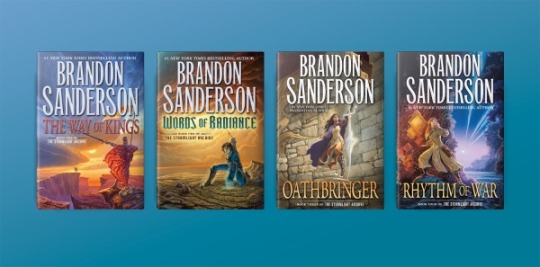
Status: ongoing, expected 10 books in total, 4/10 out at the moment
Book 1: The Way of Kings. The Way of Kings takes place on the world of Roshar, where war is constantly being waged on the Shattered Plains, and the Highprinces of Alethkar fight to avenge a king that died many moons ago.
2. The Craft Sequence by Max Gladstone

Status: finished, 6/6 books out.
Book 1 (in publication order): Three Parts Dead. Comprised of 6 standalone books set in the same universe, the Craft Sequence tells the tales of the city of Alt Coulumb. The city came out of the God Wars with one of its gods intact, Kos the Everburning. In return for the worship of his people, Kos provides heat and steam power to the citizens of Alt Coulumb; he is also the hub of a vast network of power relationships with other gods and god-like beings across the planet. Oh, and he has just died. If he isn’t revived in some form by the turn of the new moon, the city will descend into chaos and the finances of the globe will take a severe hit.
3. Hierarchy by James Islington
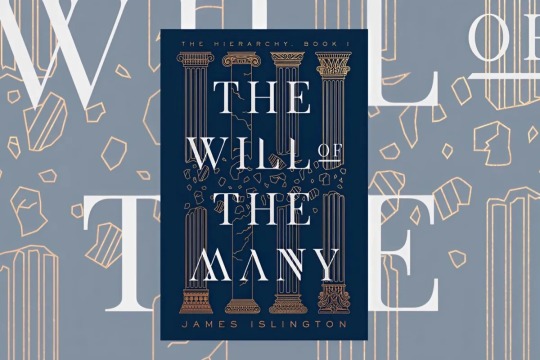
Status: ongoing, 1/3 planned books out
Book 1: The Will of the many. The Will of the Many tells the story of Vis, a young orphan who is adopted by one of the sociopolitical elites of the Hierarchy. Vis is tasked with entering a prestigious magical academy with one goal – ascend the ranks, figure out what the other major branches of the government are doing, and report back. However, that isn’t quite as easy as Vis or anyone else thought it was going to be…
4. Suneater by Christopher Ruocchio
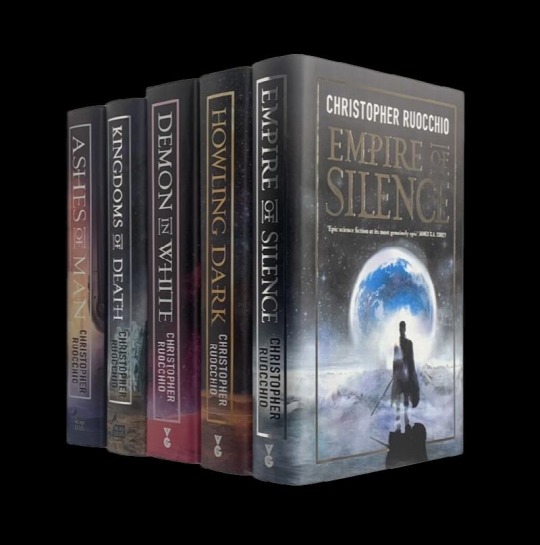
Status: ongoing, 5/7 books out
Book 1: Empire of Silence. Hadrian is a man doomed to universal infamy after ordering the destruction of a sun to commit an unforgivable act of genocide. Told as a chronicle written by an older Hadrian, Empire of Silence details his earlier adventures and serves as an introduction to the characters and the setting.
5. Dune by Frank Herbert
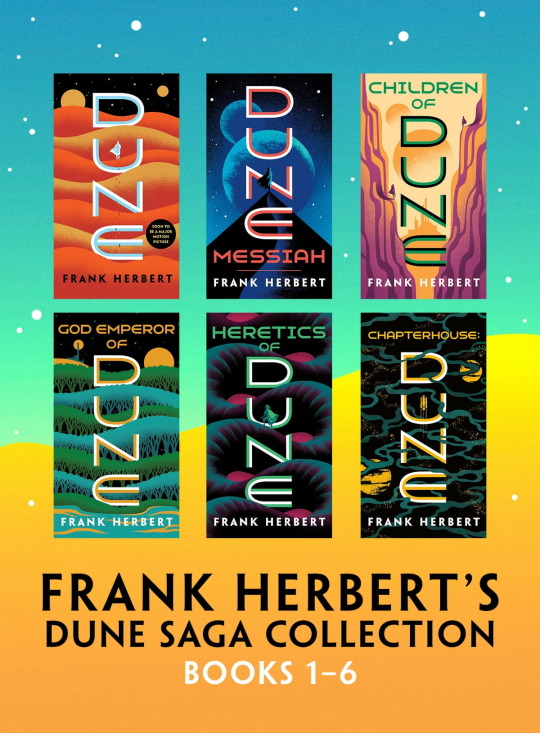
Status: completed, 6/6 books out
Book 1: Dune. Set in the distant future amidst a feudal interstellar society in which various noble houses control planetary fiefs. It tells the story of young Paul Atreides, whose family accepts the stewardship of the planet Arrakis. While the planet is an inhospitable and sparsely populated desert wasteland, it is the only source of melange, or "spice", a drug that extends life and enhances mental abilities.
6. The Expanse by James S A Corey
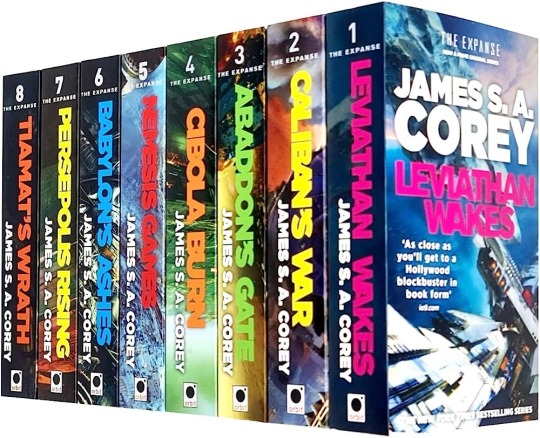
Status: completed, 9/9 books out
Book 1: Leviathan wakes. Set hundreds of years in the future, after mankind has colonized the solar system. A hardened detective and a rogue ship's captain come together for what starts as a missing young woman and evolves into a race across the solar system to expose the greatest conspiracy in human history.
7. The First Law by Joe Abercrombie

Status: completed. 3 books in the original trilogy + 3 standalone books + 3 books in the newest trilogy
Book 1: The Blade Itself. The story follows the fortunes and misfortunes of bad people who do the right thing, good people who do the wrong thing, stupid people who do the stupid thing and, well, pretty much any combination of the above. Survival is no mean feat, and at the end of the day, dumb luck might be more of an asset than any amount of planning, skill, or noble intention.
8. Cradle by Will Wight
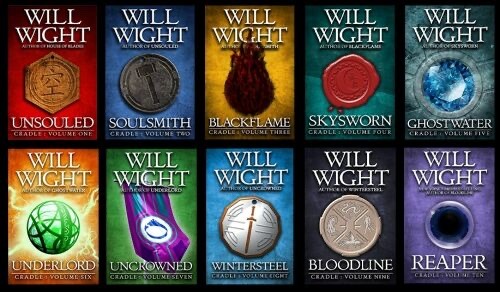
Status: completed, 12/12 books out
Book 1: Unsouled. Lindon is Unsouled, forbidden to learn the sacred arts of his clan. When faced with a looming fate he cannot ignore, he must rise beyond anything he's ever known...and forge his own Path
9. Hyperion Cantos by Dan Simmons (one PB’s favorites)
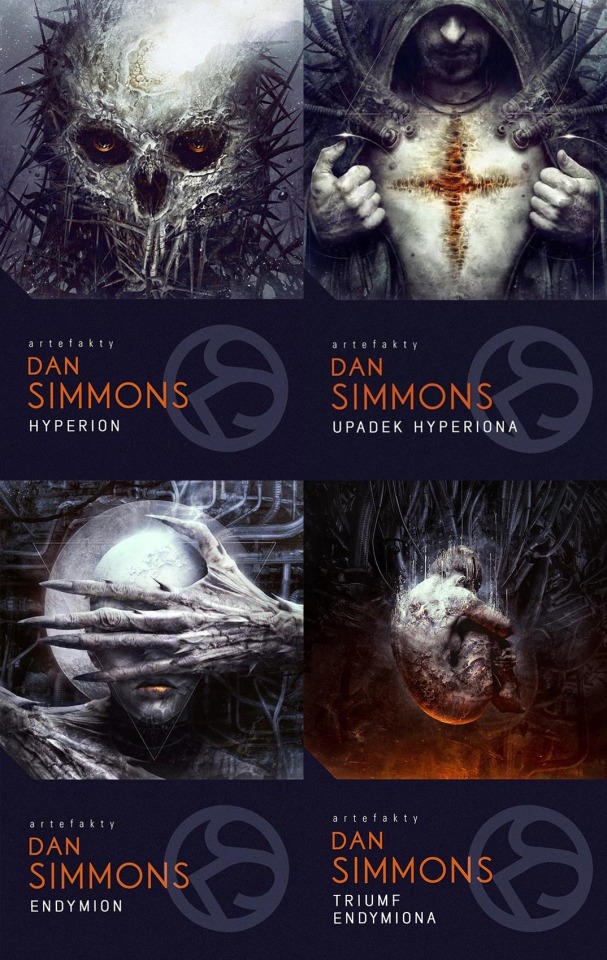
Status: completed, 4/4 books out
Book 1: Hyperion. The story weaves the interlocking tales of a diverse group of travelers sent on a pilgrimage to the Time Tombs on Hyperion. The travelers have been sent by the Church of the Final Atonement, alternately known as the Shrike Church, and the Hegemony (the government of the human star systems) to make a request of the Shrike. As they progress in their journey, each of the pilgrims tells their tale.
#red rising#golden son#morning star#pierce brown#dark age#iron gold#light bringer#what to read#book rec#book recommendation#books#stormlight archive#hyperion cantos#craft sequence#the expanse#hierarchy#the will of the many#first law#suneater#sun eater#dune#cradle series
761 notes
·
View notes
Text
Why the Northern Fremen don't believe in the Prophecy
The reason is just an incredibly simple, sociological reason. What do they keep pointing out about Arrakis? That the south is harsh and uninhabitable... to outworlders. We know this harsh environment increases religious fervour to bolster survival, but what does this mean for the north? Why did they lose their faith?
The settler's cities, Arrakeen and Carthag, are situated in the north. The Harkonnens don't believe the south is habitable so they only mine spice in the north. Their brutal suppression of the Fremen are only in the north.
So imagine you are one of the Northern Fremen. You know there's a prophecy about the Lisan al-Gaib, the Voice from the Outer World that would save your people. But here are these outworlders, who rampage your planet, who enslave and brutalize your people, who only see Arrakis as a resource, and its inhabitants as a means to an end, or "rats" that are in the way of their bottom line. Rats to be exterminated. Seeing all of this, of course you would start to doubt the prophecy. If this is how real outworlders are, why would the Lisan al-Gaib be any different from them?
And this is why Chani and the other Northern Fremen stop believing. They see through its manipulation of the Fremen. But they also understand that if the Fremen band together and fight back, they can win battles on their own. The Southern Fremen don't see any of this, because they're essentially protected from the violence of the colonizers by the dust storms near the equator. They might hear stories about the Harkonnens, but that wouldn't shake their faith in the Lisan al-Gaib. They are willing to simply wait for the "right" kind of outworlder, which does come along in the form of Paul and Jessica.
I think this is a really clever explanation of this divide in the thinking of the Northern and Southern Fremen, which is also related to the idea of how the environment that people grow up in shape their beliefs and their culture. Even though this is a departure from the first novel, this change is still true to the spirit of Frank Herbert's Dune.
#dune#dune film#dune part two#dune part 2#the fremen#fremen#dune movie#chani#lisan al gaib#analysis#sociological storytelling
153 notes
·
View notes
Text
Which couple from another text, narrative, and story most reminds you of Anidala and why?
This prompt was posted by @skywalkr-nberrie in our lovely Anidala Forever Support Group.
This took me a while to think about, and it was SO HARD. Partly because there are so many great fictional couples that share similarities, but also because let’s be honest… there really aren’t many couples (at all) that can live up to the epic romance of Anidala.
But I finally settled on another of my favorite fictional couples as a great comparison to answer this question.
Paul Atreides and Chani Kynes from Dune.
(The book, please read the book, not the movie. The movie does a decent job, but the book is far better.)

Paul Atreides, heir to a noble family, is thrust into a treacherous power struggle over the desert planet Arrakis, the sole source of the galaxy’s most valuable substance, spice. Betrayed by the Emperor and other rival houses, Paul allies with the natives of Arrakis– the Fremen– and masters their ways so that he can embrace his destiny as their prophesied leader. Paul often struggles against his destiny, because he has visions that his actions will lead to the deaths (and genocide) of billions across many worlds (which is exactly what happens), but he also cannot escape it.
Chani Kynes is a Fremen warrior, and becomes Paul’s confidant and guide to the ways of the desert. She helps him navigate Fremen culture and helps him adapt to life on Arrakis. She is a grounding presence for Paul, supporting his transformation into the prophesied leader.
Paul and Chani fall in love and are married according to Fremen custom, but this marriage is not recognized by the Imperium. Because of the political situation, it becomes important for Paul to enter a political marriage with the Princess Irulan, daughter of the Emperor– which makes Paul the next Emperor of the known galaxy. He hates doing this, because he only wants to be with Chani, who officially (in the eyes of the Imperium) becomes Paul's concubine– but Paul only ever sees her as his true wife.
The Princess Irulan becomes jealous, because Paul never “goes to bed with her” and he is only ever with Chani. So she ends up poisoning Chani so that Chani cannot get pregnant. This makes Chani so upset, so she uses the powerful drug spice to counteract the poison. This allows her to get pregnant, but she uses the spice so much she ends up overdosing and Chani dies giving birth to twins. This devastates Paul, blinding him both emotionally and literally, then he wanders out into the desert in his grief to die.
Paul and Chani, like Anakin and Padmé, share a love that knows know bounds. Both couples share a love that is pure, and unwavering, all consuming and never ending. Both couples are surrounded by people and circumstances trying to pull them apart, both Anakin and Paul are deeply surrounded and troubled by prophecy. Both Chani and Padmé die in childbirth to twins. Both couples would do anything for each other, even destroy themselves– which they all do.
In the end, death is the only place where both couples are able to be together in peace.
Also, yes, George Lucas was absolutely inspired by Frank Herbert's Dune. You think it's pure coincidence that spice is also a drug in Star Wars? That Luke and Anakin came from a desert planet?
#dune#Paul x chani#anidala#anakin x padmé#star wars#couple similarities#dune and star wars#anakin skywalker#padmé amidala#Paul atreides#chani kynes#anidala prompt#anidala forever support group
21 notes
·
View notes
Text


EPIC SCI-FI FIRST EDITIONS WORTH MORE THAN YOUR LIFE -- BOOK DETAILS ARE AS FOLLOWS:
TITLE: "Dune"
AUTHOR: Herbert, Frank
BINDING: Hardcover
EDITION: First Edition
PAGES: 412
VOLUMES: 1
LANGUAGE: English
PUBLISHER: Chilton Book Company, Radnor
DATE: 1965
BOOK OVERVIEW: "The first in the epic science fiction series of the same name, "Dune" is set on the desert planet Arrakis, host to "the Spice" - the most important resource in the universe, needed for interplanetary travel and coveted for its effects on longevity and granting incredible psychic powers among humans. Amidst an intergalactic power struggle, would-be heir to the planet's stewardship Paul Atreides is cast out into the desert to die following a coup. Joining a group of zealots called the Fremen, Paul soon becomes considered their messiah - Mahdi - and recognizes in them a formidable fighting force with whom he can retake control of Arrakis. "Dune" won both the Hugo Award for Best Novel and the Nebula Award for Best Novel.
FIRST EDITION IDENTIFICATION:
""Dune" is one of the high points for science fiction collectors and was first published in 1965 by Chilton Book Company in Philadelphia (an interesting departure for the publisher, who to that date had only published automotive repair manuals). The true first will read "First Edition" on the copyright page, with no subsequent printings, and will be in blue cloth boards. The jacket is a pictorial dark red and blue desert scene, and the rear panel has a map. The price on the jacket flap should be $5.95 and the rear flap should have the Chilton address across four lines."
-- BIBLIO, "The largest independent book marketplace in the world, with over 100 million books"
Sources: https://sarehlovasen.wordpress.com/2021/10/19/rating-all-of-the-dune-book-covers-i-can-find/ & eBay.
#Dune#Dune 1965#Dune First Edition#1965#Dune Hardcover#Dune Hardcover First Edition#Science Fiction#Science Fiction Novel#Novels#Books#First Edition Books#Vintage Sci-fi#Frank Herbert#Dune John Schoenherr#Sci-fi#Arrakis#Planet Dune#Sci-fi Art#Sci-fi Fri#Illustration#Frank Herbert's Dune#Sixties#Cover Art#60s#1960s#60s Sci-fi#Dust Jacket#Dune First Edition 1965#Dune Hardcover 1965
26 notes
·
View notes
Text
DUNE AU DAMIAN WAYNE X READER PART FIVE
Mild brutalia
Fem reader
Notes: Under no circumstances should opinions expressed by characters be linked to this author in anyway. This is written in the style of Frank Hebert’s book, this means spoilers for Dune. While inspired by Frank Herbert’s novel the plotline may be similar, however it will not be the same.
Buckle up my friends this is where the Dune AU partially ends and I start getting more creative with the World building. If you have read any books after the Dune, I’m afraid I haven’t read them, so what I’m saying may be incorrect in canon. For that I am sorry.
Imperial terminology
Bene Gesserit: The ancient school of mental and physical training established primarily for female students after the Butlerian Jihad destroyed the so-called ‘thinking machines’ and robots.
Caladan: Third planet of Delta Pavonis.
Filmclip: An apparatus used mainly for training consisting of a shigawire imprint carrying a mnemonic pulse.
Faufreluches: The rigid imperial system of class stratification.
Shield, defensive: The protective field produced by a Holtzman generator. A shield will permit entry only to objects moving at slow speeds.
Spacing (Guild): Powerful organization which ad a monopoly on space travel and transport due to their Navigators.
Spice: (Known as Melange) Spice of all spices, the crop of which Arrakis is the unique source. When taken in small quantities it is mildly addictive, severely addictive when taken in large quantities daily.
Mating index: The Bene Gesserit master record of its human breeding program aimed at producing the Kwisatz Haderach.
Mentat: The class of imperial citizens trained for supreme accomplishments of logic. ‘Human computers’.
Sapho: High-energy liquid extracted from barrier roots of Ecaz. Used by Mentats who claim it amplifies mental powers. Users develop deep ruby stains on mouth and lips.
Arrakis is the home of spice. Power over spice, is power over all. Spice is used primarily for space travel by the spacing guild and is ranged as high as 640,000 Solaris per decagram. Put simply, without spice, space travel would cease to exist. History of the Empire- Empress Y/N
“House Napier have good connections with the Emperor, rumour is that they have been scheming for many years. Arrakis is the vessel for their ploy.” Grayson relayed his coffee steaming beside him on the War room table, of course he needed stimulants he was telling his entire family everything that had occurred to him for the last nine years.
Damian was still tossing and turning the details over how Grayson came by this information. It was supposedly a simple reconnaissance mission, yet Grayson somehow found himself trapped in a web of lies and deceit. He��d changed his identity and posed as a servant to one of the lower nobles in House Napier, that way he had found out enough information without arousing much suspicion from the Duke of House Napier himself.
It was surprisingly effective for such a half baked plan.
“The emperor has grown distant to our House as of late.” Lady Talia replied which Grayson returned with a slightly soured look. Damian had almost forgotten how Grayson wasn’t too fond of Lady Talia.
“How do they plan on using Arrakis? A trade war?” Duke Wayne spoke with a tone tinged with anger, his fists clenched underneath the table, causing Damian to share a quick glance with his mother.
Dick replied hurriedly, spilling the information out. “Yes, they are planning a political War. The emperor will set a decree demanding House Wayne to be responsible for a small quantity of spice production on Arrakis. They believe that by the end of the ‘trade war’ House Wayne will be partially crippled by the costs, leaving us vulnerable.”
The silence that filled the room felt almost suffocating. It was slowly making its way around the war table and strangling each member of the meeting, till they were just about to pass out, then it moved onto the next victim.
Partially crippled is a nice way of putting it, it won’t take long for House Napier to kill us off if we lose. Damian bitterly thinks his lips curling into a familiar scowl.
The Duke took charge strongly, striking down the silence with his sharp tone, “Lucius produce a report on our finances and assets everywhere, we need to start saving and shave expenses off. Tell all the soldiers which commute here that they are expected to live here permanently, in order to reduce travel costs. I want fewer staff employed, increase the work loads and hours of others. We will not be rationing necessities under any circumstances. No information shared by Grayson here today will be discussed with anyone, other than the strategic commanders. We must start funnelling money into our trading industry which is in a poor state. I expect we have a mole or someone which has been captured by House Napier feeding them information, since the likelihood of them knowing this weakness is low. As of now we are in a political war with House Napier.”
Damian’s first thought was Jason Todd, not much was known about the man since the records of him had been wiped. He was an overzealous spy working for House Wayne, he had been caught and killed. House Napier had made it clear that they had killed Jason years ago however.
Who’s the mole?
Surely it couldn’t be Duke Thomas, the man was devoted to House Wayne and its core values- although he had recently gone on a business trip.
Damian’s 18th birthday has been a couple of weeks ago and his mother was already hounding him about a future wife. Perhaps this trade war would snap her out of it, considering how even during this emergency he was still thinking of his girl.
The Faufreluches are barriers which divide us instead of joining us together.
Lessons From The New Emperor- Empress Y/N
Damian’s head was pounding, after the meeting he’d bolted before anyone could bother him. He couldn’t bring himself to talk to Dick, he didn’t want to hear his mother lectures and he certainly wasn’t a fan of seeing his father stressed.
As Damian hammered punch after punch into the training dummy the thought of being Duke of House Wayne banged around in his head. Panting he felt his hands slick with sweat. His headache focused its sharp attack to the front of his head and he couldn’t help but vomit a little in his mouth.
Damian stumbled backwards into the wall, hanging his head down with shame. How dare he hope to succeed as Duke, if he could barely contain his emotions? There was no point in reciting the litany against fear, because he wasn’t afraid, he was just...
“Are you ok my Grace?” A soft voice intoned.
Oh god it was her.
Damian pushed himself up against the wall hastily and tipped his head in attempt to move his hair out of his face.
“Yes.” He panted out while strongly nodding, which caused his headache to scream in his head.
“Are you sure?” The girl frowned and stepped closer to where he was leaning up against the wall.
He cleared his throat, “Quite fine, yes.” His cheeks roared red which had nothing to do with his exercise.
“It’s just that-,” the girl hesitated, yet she continued walking towards him slowly, like he was a stray cat that would spook easily. “You don’t look nor sound very well.”
The girl had quite a posh accent Damian realised, despite the beauty of his dreams they did tend to blur certain details.
Damian’s face softened, “I appreciate your concern.” The girl barely knew him and yet she treated him with such kindness, he felt his muscles relax as he slumped slightly against the wall. A nervous silence filled the room, but Damian was determined to impress the girl of his dreams.
“I see you looking at me sometimes.” Damian mutters bashfully.
The girl blushed and tilted her head down, but then she lifted it back up, “And I see you looking right back at me.” She was challenging him, daring him to admit that they’d been dancing around each other for weeks upon weeks.
Damian straightened, finally regaining enough of his strength to level a stare at her. “Who are you devoted to?”
“My lady Cassandra of course.” She replied instantaneously, like she’d been repeating the phrase all her life. So then why the posh intonation? Maids and servants didn’t have them.
Damian took a step towards her, his face like stone while his heart thumped. He dropped his head down close to hers, not missing the way her breath caught, “And what of your allegiance to my house?”
The girl gulped and replied quietly, “I am loyal to you.”
“Why’s that?” Damian responded quickly.
“Lady Cassandra trusts you and… I see a great deal of strength in you.” She admitted.
“Well your analysis is all I require.” He sarcastically retorted.
She narrowed her eyes at him in response, but Damian knew he was scarier- no one was as cold as him.
“I’d like to talk to you-“
“We’re talking right now.” She interrupted, causing him to shoot her a warning glare.
“In private.” He finished with gritted teeth, resisting the urge to smirk when she froze in shock. “Think you can handle that?”
The girl nodded slightly awestruck as if she just saw him slay the moon.
“Good- the cliffs midnight. I’m sure you’re smart enough not to be late.”
Tag list: @maria-trisha @n0voselics
11 notes
·
View notes
Note
Who’s Piter? (Full disclosure, I’m entirely prepared for rambling, I’ve just never heard of this)

HIIIIIIII OKAY SO. Basically. Piter de Vries is this guy from hit 1960s scifi novel Dune by Frank Herbert. He’s the right-hand to the main villain, The Baron Harkonnen. He’s only in the first half of the first book, and some of the bad prequel novels.
Piter’s whole thing is that he’s a Mentat, a human trained to essentially function like a supercomputer and be crazy good at calculating shit. (Because “thinking machines” have been outlawed in the world of Dune, so no computers!) but also he’s specifically this thing called a TWISTED MENTAT, which means he’s a computer who’s evil and has no moral compass. It’s up to interpretation what exactly caused this— there’s sorta two theories with equal amounts of evidence. One: this one evil organization purposefully fucks up Mentats to MAKE them essentially lose faith in morality and humanity as a whole. Like reeeeaaally fucks them up. And two: they’re actually just born like that. Like the mentat was already predisposed to “evil” behavior and that one organization just exploits that and employs them.
I sorta think it was a mix of that for Piter, I think he was born with obvious signs of brain illness and that was exploited and exacerbated by whatever he was put through. I think if he wasn’t “twisted” he probably would’ve grown up to he just some kinda strange asshole, rather than one of the most wretched guys you’ll ever meet.
That being said, the actual gist of Piter’s personality and description is this: eccentric and snarky conniving guy who LOVES to torture. He’s also shown to be very power-hungry, and subtly obsessed with control and death as a whole. And also poisons. He has a passion for poison-making. As a mentat, he’s also an assassin of sorts, cause turns out they’re pretty good at that. He’s described as having a terrifying “silky” voice, so kind of like if a snake was a guy. He’s also described as followed: a short “effeminate” man with frizzy hair, probably wears platform boots, blue-within-blue eyes, and red-stained lips. (“It was like a mask grimace over those eyes like holes”, to quote the book directly.) his eyes and mouth are an important detail, because those come from all the DRUGS he takes. Like so many. He’s specifically takes Spice, the most important substance in Dune basically. That’s what makes his eyes that weird blue! So he’s like… unnerving-pretty. Weird looking but pretty in the way a very toxic sea creature is. Do NOT touch. Sometimes he refers to himself in the third person and he sounds like the Miette cat post.
BUUUUT YEAH so like, weird guy amiright? I’m prone to loving evil right hand man characters, I’ll be for real. But what really got me crazy about his character is how he’s treated in the story by various characters. Sure, he’s a bad awful guy and all that- but he is also CONSTANTLY dehumanized. Specifically by his “employer”, The Baron. Who is a whole other can of worms. There’s even a whole scene where the baron puts Piter on “display” and refers to him as “it”. The baron also explicitly exploits Piter’s drug addiction to get him to comply and stay “loyal”, which is particularly scary I think, because spice withdrawal is incredibly deadly.
Piter and the Baron have some of the most bonkers banter in the entire book. It’s comedically evil in every way. You can tell they HATE each other but it’s hidden under so many layers of scheming and posturing. Piter would take the barony if he could 💪💪💪😔😔😔 Piter is also THE guy who comes up with the entire coup against the main character’s noble house that sparks the main events of the entire book??? Like he states directly that it was HIM. On like page 21 of the book. And this is not talked about much. None of his movie versions really get to the “meat” of his character, especially the newest Dune films. He’s very glossed-over, honestly. Which is a shame because as you can tell, I find him fascinating!
I think���. I’m done now… thank you for coming to my Piter talk… I hope this is enlightening 💚
#rambles#thank you for asking!#this was enriching for me to ramble about#my bad if there’s any typos… I just woke up a little bit ago…#I’m really detail-oriented so I hope this isn’t too like#cluttered I suppose#what I’m saying is I hope it makes sense!
23 notes
·
View notes
Text


“The people who can destroy a thing, they control it.” -Frank Herbert, Dune, 1965
Across the world, the movie-watching public will soon behold the Fremen of Dune sack and destroy the Empire, starting on their homeworld of Arrakis. This irresistible moment, where the rebels actually win, is sure to sink into the mass-public consciousness, but despite all the Arabic names and parallels between spice and petroleum, the true story of the Fremen deserves to be told, especially now, given what’s at stake.
Frank Herbert, the author of Dune, lived the happiest parts of his childhood in a failed socialist colony called Burley, located along the Salish Sea near the city of Tacoma, Washington. It was dreary and cold during the fall and winter, and back in the day, before Herbert was born, all the excitement further down the sea in the anarchist Home Colony, a much more successful experiment in collective living. While the socialists of Burley struggled to replicate their small colony, Home grew bigger every year, even converting some of Burley’s socialists into anarchist defectors.
Regardless, both the anarchists and socialists were used to living a rugged lifestyle in the middle of nowhere, remote communities with no road access that were connected together by twice-a-day ferries, if that. Everyone had to chop wood, shovel animal shit, hammer nails, grow food, cook food, mill lumber, construct houses, erect piers, build bridges, and all the like. However, in the anarchist Home Colony, there was far more autonomy than in Burley, and teenage anarchists were building their own houses, using dynamite to blow up stumps, shoot rifles, pilot their own boats, and dancing late into the night by raging bonfires.
When the young Frank Herbert was growing up, Home was known for many things, among them its Saturday night dances, the wildest and most popular around, and even when Herbert was himself a teenager, Home was where you went for a good time. Given the drabness of Burley and his own semi-Catholic upbringing, it’s hard to not see these dances as the infamous spice orgy of the Fremen, a moment when the rebels finally let down their rock-hard armor and feel good for a change, rather than being ruthless fighters committed to destroying the Empire.
Make no mistake, Home housed some committed, dedicated, and fervent anarchists, and some of them weren’t just homesteaders like Frank Herbert’s family, they were anarchist homesteader militants who smuggled dynamite, fomented uprisings in the coal fields of Vancouver Island, sheltered fugitives, shot at private detectives during strikes, and called for the death of capitalism. Beyond this, these anarchists were directly implicated in the 1910 bombing of the ultra-reactionary and anti-labor Los Angeles Times building, given they helped hide the man who supplied the dynamite, the anarchist David Caplan.
The anarchists who bought the land where David Caplan hid out were from Home, and their names were Ersilia Cavedagni and Leon Morel. Both of them ran the anarchist metal foundry at Home and could fabricate anything their community might need, including gears, keys, nails, fixtures, stoves, candlesticks, type-face for printing plates, anything metal, be it brass, iron, or copper. Just like the Fremen fabricate thumpers, sand-compacters, and still-suits in their hidden sietches, the anarchists of Home fabricated everything in their remote region, something they were well known for.
Frank Herbert’s grandfather Otto had been a socialist and follower of Eugene Debs, and he moved his family to Burley Colony in 1905, just as the community was falling apart. Given how close Burley was to Home, the Herbert family learned much about their anarchist neighbors, especially when several of them were arrested during a nude bathing scandal. The Herbert family was in Burley from 1905 to 1919, the year Home ceased to exist as an anarchist community, and they were nearby for all the major intrigue and conspiracy that took place there. Given young Frank Herbert’s love for his grandfather Otto and grandmother Mary, both socialists, it’s likely he cherished their stories from the old days and sought them out over stories from his father, who became a cop.
Born in Tacoma in 1920, Frank Herbert moved to Burley with his family in 1928, although the young boy was already familiar with the region, having gone on many family trips. Like the anarchists of Home, young Frank woke up in the frosty time before dawn, he milked the cow, collected eggs and fed the pigs, just as his family had a large vegetable garden, with corn, peas, beans, carrots, lettuce and other crops. This was the type of self-sufficient, backwoods living Herbert shared with the anarchists of Home, the living legends of their sleepy region.
Just like them, young Frank fished for his supper, and especially liked to fish in Burley Creek, which was loaded with brook trout. In the fall, salmon were so plentiful that they would be caught with bare hands. There were many smokehouses in the area, some dating back to the days of Burley Colony. It was a picturesque creek, winding through a forest of cedar, alder and maple and falling across a sequence of rocky beaches. This primordial landscape was shared by the anarchists of Home, and similar to them, young Frank smoked much of the salmon he caught, and took it to school for lunch, along with fruits, vegetables and hard-boiled eggs from the family farm. Even in regards to hunting deer, Frank Herbert would recall, there was no sport to it. They just went out and got meat for the family.
There was still dancing in Home when Frank was growing up there, and not only was he known to canoe down there, his parents moved from Burley in 1931 and opened a dance hall on old Highway 99 near Seattle, a speakeasy that made a lot of money. Keep in my mind, Frank’s father was a former cop, and he quit to become a boot-legger, but he and Frank’s mother were pushed out of the dance-hall business by their partners, and by 1933, the family was broke and living near Tacoma to be near their family.
This allowed young Frank to return to Burley where he sought refuge in his canoe, and during one journey, he met a member of the Hoh tribe, known as Indian Henry, and these two became good friends. Similarly, the anarchists of Home had known an indigenous Squaxin who was called Indian Jim, and just like Frank, the anarchists would meet the natives as they paddled around in their boats and canoes, exchanging much local knowledge. All this to say, Frank Herbert was raised very much like the anarchists of Home, and while the socialist colony had fully collapsed by 1920, there were still many anarchists who lived in Home in the 1930s, and Frank moved among them.
Frank’s dad eventually returned to being a cop, just as his alcoholism got worse, and soon enough the wild child raised by socialists was consumed by work and school in Tacoma, where he lived the big city life and left behind his rugged childhood. Without doubt, Frank knew of the anarchist rebels hidden out in the woods, having grown up hearing tales of explosions, guns, and arson, and if the Fremen are meant to represent anyone, its those hard-working, do-it-yourself, bomb-throwing anarchists of Home, and just like the Fremen, they had suffered years of defeat and repression at the hands of the US empire. With such an irresponsible cop father, Frank Herbert held an eternal soft-spot for those anarchists who lived just south of Burley, just as he encoded his own love for his grand-father’s old brand of socialism in his writing.
In the novel Dune, a character named Duncan Idaho is sent to make an alliance with the Fremen, something he barely achieved with these distrusting rebels. Many have laughed and wondered why a character from the year 10,191 would have the last name Idaho, but back in the old days, Idaho was where the crazy bomb throwing miners lived, the ones who blasted apart their ex-governor in 1905. It was a place where Eugene Debs had called a rebel army to invade Boise, a place where rebels had hijacked trains and gone mine to mine blowing up their shafts with dynamite. Before it was known as a racist, conservative hotbed, Idaho was where the hardest, fiercest rebels were known to reside, and young Frank probably learned of this Idaho from his socialist grandfather Otto. Fittingly, Duncan Idaho is not only the best fighter, he is naturally trusted by the Fremen for his dignity and honesty.
In the end, Frank Herbert’s Dune and Dune Messiah serve up some of the oldest anarchist propaganda, not only by commenting on the corrupting influence of centralized power, but by spending nearly 1,000 pages to reaffirm one of anarchism’s oldest slogans: no one is fit to rule, and no one deserves to be a slave. Herbert’s natural sympathy was with the rebels, the underdogs, the Fremen, the anarchists of Home, and that’s why the upcoming cinematic rendering of the Empire’s defeat will be so gratifiying, as is being teased out in the official trailers. However, Dune is only one half of Herbert’s initial warning, or act of prediction, as he called it, and the second half is much darker
Nevertheless, the Fremen are meant to represent the best of those who lived in that isolated backwater of the Salish Sea, the hardcore anarchists who made everything for themselves, who organized attacks on the empire themselves, who never stopped fighting, not in the 1920s, not in the 1960s, and not today in the 2020s. Without doubt, the anarchists of Dune are the Fremen of Home, and their backwater paradise of total freedom, that violent, nomadic utopia, is what many characters long for when the state becomes too powerful, those simpler days when one could wander forever in a land that was a part of them, just as they were a part of the land, however hostile and uncompromising it may be.
Death To The Empire!
Long Live The Fighters!
Long Live Anarchy!
#Dune#dune movie#dune books#film review#book#books#frank herbert#pnw#pacific northwest#pop culture#sci fi#science fiction#cinema#movies#films#Home Colony#literature#The Transmetropolitan Review#anarchism#anarchy#anarchist society#practical anarchy#practical anarchism#resistance#autonomy#revolution#communism#anti capitalist#anti capitalism#late stage capitalism
3 notes
·
View notes
Text
As someone who hasn't read any of the Dune books and knew virtually nothing about the nature of the world the story takes place in before watching the Villeneuve films, the particularities of this distant distant future that Frank Herbert created are kind of blowing my mind. (Please correct me if any of my comments below are inaccurate)
This is a sci-fi world in space with no aliens and no computers. Instead, some of the humans have become alien-like or computer-like--by harnessing the powers of the human mind and enhancing them with Spice. The biopunk angle + providing at least a semi-plausible explanation for the development of superhuman abilities creates a fascinating narrative blend that reads more as mythology than speculative science fiction. Who could come up with a future that feels so ancient?
Maybe I need to rewatch the Villeneuve films again (which I'm planning on doing very soon!!), but I didn't quite catch any of this from watching the films alone. Maybe it's a good thing that Denis and co. didn't try to burden the audience with too much worldbuilding lore, but for me, knowing this context makes the story so much more interesting. I just think the role of technology in the Dune universe is a really important aspect to delve into since it explains a lot of things such as why hand-to-hand combat is so prevalent, why Spice matters so much, etc.
(These thoughts were prompted by this article)
7 notes
·
View notes
Text
some thoughts on Dune
It's 5 AM and I can't get back to sleep, so clearly it's time to ramble about Dune on the internet.
I recently rewatched part one of Villeneuve's movies and then saw part 2 in theaters this week.
I've seen the David Lynch Dune a couple times in the past few years, mostly because I wanted to see the Villeneuve. I love Lynch, but his adaptation is wild--very fun, but it feels like a fever dream, and he has spoken openly about how the studio fought him and the process of making the film was awful for him. It's also such a dense source material, that it's so hard to fit into one two hour movie. Hence, the last 45 minutes try to cover major plot points and it feels rushed and scattered.
So the new Villeneuve adaptations have more time to really introduce to Dune's world of interplanetary Empire, the warring houses and factions under the Emperor, and the planet of Arrakis which is coveted by the Empire for its precious resource of Spice--and therefore exploited and oppressed.
I didn't really catch the very clear commentary on imperialism and extractive capitalism until I saw part 1 of Villeneuve's Dune (because I was just so bewildered by the fun fever dream quality of the Lynch movie). But it's so clear--especially that scene where the Atreides first arrive on Arrakis and leave their ship with their flags flying and an honor guard playing bagpipes and Duke Leto and Paul in ceremonial Caladan attire while Lady Jessica has donned traditional Arrakian clothing. It's so clearly an intentional parallel to the British Empire in the Middle East and North Africa (MENA).
What's wonderful about Dune 2 is now that the stage is set, we really get to dive into the world of Arrakis through the lens of its indigenous population, the Fremen.
A friend and I binged through the SyFy Dune miniseries between part 1 and the release of part 2. And something that has been pointed out in video essays, and was very striking and meaningful to me, is that the novel and every adaptation show us Arrakis through the eyes of Paul Atreides, Princess Irulan, and other outworlders. Villeneuve's Dune is the first adaptation to open with a quote from a Fremen, Chani, who says "My planet Arrakis so beautiful when the sun is low..." in the opening shot of part 1, as the camera pans over a sea of sand dunes, glimmering in the evening light. It really sets the tone for both of the new films: Dune is Arrakis' story; it's the Fremen's story.
And in part 2, we get to watch Paul transform personally and reach mystical, messianic superhuman status (against his own will and intuition) but just as importantly we watch him integrate himself into Fremen culture and learn to fall in love with the culture, language, and ways of the Fremen, as well as falling in love with Chani. It becomes her story as much as his (FINALLY an adaptation where we get to see Chani really become an interesting character in her own right! I don't really remember her from the miniseries; she has an active role, but clearly didn't really stand out to me. And she barely has any lines in the Lynch movie).
Part 2 lets us see the anti-colonial struggle for independence and autonomy and protection of the planet and native culture from the perspective of its native people, and also the harm of outside cultures like the Bene Gesserit co-opting and exploiting the desire for freedom and independence to spread religious zealotry.
The debates between Chani, Stilgar, Lady Jessica, and Paul regarding the messianic prophecy and the counterpoint that the Fremen should save themselves is so compelling and rich!
I was reminded throughout the film of the story (and movie) of Laurence of Arabia. Which I now want to rewatch. In interviews Villeneuve pointed to the film as a direct cinematic influence on not just Dune but his entire process as a film maker. And Frank Herbert cited the real events of Laurence's time with Arabic Uprising against the Ottoman Empire in WW1 as a direct influence on the first novel in the Dune series.
A couple friends and I all started listening to the audiobook recently and have started an accidental book club. I really love the prose and the richness of the world Herbert creates and his focus on the environment and ecology of the planet Arrakis as well as the political intrigues and critique on colonialism and extractive capitalism.
So the other day I was curious about the social context of the novel and other inspirations Herbert may have had, so I consulted my favorite scholarly journal Wikipedia (as the hilarious hosts of the podcast the Bechdel Cast call it. If you like movies, intersectional feminism, and funny people, give it a listen. It's so fun!) and was quite surprised that one of the major influences that inspired the novel (published in 1965) was that in the 1960s that state of Oregon in the USA where Herbert was living was having a crisis of sand dunes shifting and moving, due to the native grasses that anchored them dying out. Herbert had several Native American friends who grew up on reservations in Oregon who were actively writing about ecology and environmental protection and who were activists. He was inspired by the notion of these sand dunes potentially swallowing up whole cities and the crisis of an environment becoming uninhabitable due to human destruction of the environment.
I was fascinated to learn that Dune is regarded as one of the early examples of novels tackling themes of climate change and ecology and environmental protection, along with Silent Spring. (Thanks Wikipedia!)
Anyhow, this is a really long and rambling post so I'll wrap up. But I encourage anyone who's interested in really rich, complex sci-fi or fantasy which grapples with real-world issues like colonialism, capitalism, and the environment as well as the hero's journey to give Dune a watch and/or read. It's such a rich world! And the new films are a stunning sensory experience! The aesthetics alone are captivating. Good shit.
9 notes
·
View notes
Text
Dune (2021)
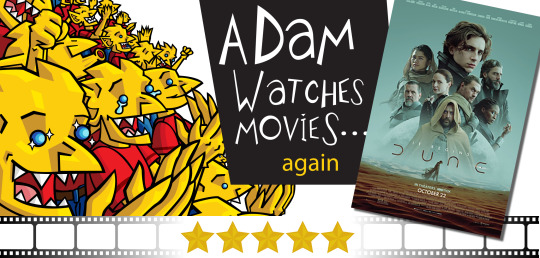
Even upon a rewatch, 2021’s Dune: Part One is spectacular. The memorable, foreboding score by Hans Zimmer, the costumes that bring this world to life, the scale of the action and the unique sets, ship & weapon designs all come together to complement a story of mythical scale. After seeing this film, two thoughts start competing for your brain’s attention. 1) If Frank Herbert’s Dune was adapted this successfully, then no work is unfilmable and 2) the sequel can’t come soon enough.
In 10191, the universe is ruled by an Emperor who assigns the exploitation of planets to powerful ruling houses. Interstellar travel is possible through “spice” a substance found exclusively on the harsh desert planet of Arrakis. For 80 years, Baron Vladimir Harkonnen (Stellan Skarsgård) and his house have overseen the harvest of spice. Now, Duke Leto I (Oscar Isaac) of House Atreides is the new steward of Arrakis but only for as long as the flow of spice continues. This shift puts House Atreides, particularly the Duke’s son, Paul (Timothy Chalamet), in danger.
At 155 minutes, you’d think this movie would feel long, but it doesn’t. One of the reasons is that there’s a lot within to keep your mind busy. What’s a Freman? What’s a Kwisatz Haderach? What’s “the voice”? If director Denis Villeneuve tried to cram this story into 90, or even 120 minutes, it would move so quickly that all these questions would leave you in the dusty sands of Arrakis (that’s the planet, right?). By taking its time while moving at a good pace the film allows you - in time - to answer all of your questions. Since you understand what’s happening, you’re engaged. It helps that if you can’t remember what each name means, the visuals pick up the ball. The grotesque, scheming Baron Vladimir Harkonnen is clearly a villain. It's particularly obvious once you see his nephew, the psychotic and childish Glossu Rabban (Dave Bautista). You know you can’t trust the Bene Gesserit because their leader, Reverend Mother Mohiam (Charlotte Rampling) makes Paul take a painful, life-threatening test to prove he isn’t a threat himself. These are only a few of the many examples I could choose and they show how the story is both complex and easily digestible.
Even without the gripping story filled with backstabbings, political intrigue, violence, quests for revenge and harrowing struggles for survival, Dune would still have you tightly in its grip. Throughout, Paul’s psychic abilities give him visions. They foretell the future… sort of. They give hints of what’s coming but hints are not the same as clear answers. These all tie to this planet he’s on; a world that doesn’t end where the screen does. The details in the dialogue, sets and costumes make you wish the Harkonnens would just chill, and save their grudge for later. This way, you’d have time to see House Atreides befriend the Fremen and familiarize themselves with their customs.
There’s so much happening in this film that some of it you won’t “get” until later. For example, the early assassination attempt on Paul’s life. The would-be killer? A Harkonnen cutthroat, hidden in a bedroom wall. What kind of wealth, power and/or terrifying influence could persuade someone to take on that sort of assignment, knowing they would have to wait in darkness for weeks, slowly starving to death, just to kill a boy?
The passion within Dune is as clear as its ambition. You’re only getting half of a movie with it, but this choice feels like a necessity, rather than a Breaking Dawn-type of cash-grab or an attempt to start another franchise for a money-hungry studio. It certainly doesn’t feel presumptuous. Everything we see feels important; like it’s building up to not just one, but many bigger character arcs in a world that contains hundreds of stories. You know the threads that are left hanging will be tied up - that’s the kind of confidence all of the artists at work instill in you. Dune/Dune: Part One is a film that’s going to be remembered. (March 1, 2024)
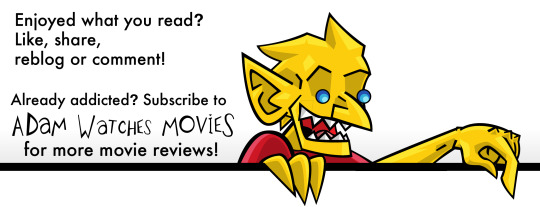
#Dune#movies#films#movie reviews#film reviews#Dune: Part 1#Denis Villeneuve#Jon Spaihts#Eric Roth#Timothee Chalamet#Rbecca Ferguson#Oscar Isaac#Josh Brolin#Stellan Skarsgard#Dave Bautista#stephen mckinley henderson#Zendaya#Chang Chen#Sharon Duncan-Brewster#Charlotte Rampling#Jason Momoa#Javier Bardem#2021 movies#2021 films
8 notes
·
View notes
Text
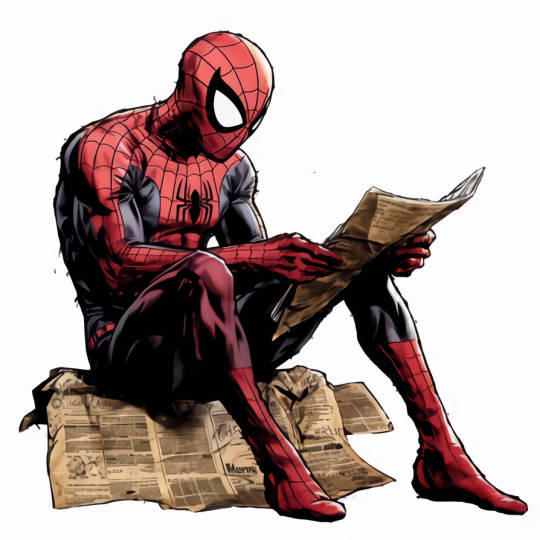
Reading Break - Worms & Spiders
Featured Art: MotaArt: (above) Rick Leonardi & Al Williamson: Spider-man 2099 #1 Mark Bagley & Art Thibert: Ultimate Spider-man #11 Patrick Olliffe: Amazing Spider-man Family #3
Welp!
It’s been longer since I last posted here than I'd hoped it would be. Unfortunately, I’ve had to prioritize work for the time being, and it’ll probably be a little while longer before I have the opportunity to post my next episode review [TNG ep. 123 will be next in line, when I do finally get to it]. In lieu of writing, I’ve been trying to be at least bit more mindful with my downtime, avoiding the various social media timewasters, and taking more time to read.
For my "serious" reading, I’ve been slowly picking away at ‘God Emperor of Dune’, which is pretty fucking trippy. Seriously, If you thought the first book was weird, then I’m here to tell you that whatever "spice" Frank Herbert was using, he upped the dose exponentially for each subsequent entry. I’ve read a lot of disparaging reviews and comments online about ‘God Emperor’ that led me to believe it might be pompous and dull, but I’ve honestly found it to be thoroughly engaging, though admittedly subject-at-times to some ignorant world views.

For my "fun" reading, my recent reviews of ‘Spider-man: TAS’ have inspired me to peruse through my old Spidey comics, which have been a real trip down memory lane (and very on-brand for this blog). The two series I’ve been bouncing between are the original ‘Ultimate Spider-man’ from the early 00’s, and ‘Spider-man 2099’ (early 90’s). I remember when each respective series was first being released, and how cutting edge each of them seemed. Overall, I’d say they hold up decently well, although clearly products of their time.
‘Spider-man 2099’ is unsurprisingly the more noticeably dated of the two, and a lot of that comes down to the now-unmistakeable 90’s aesthetic, along with the somewhat clunky ‘future slang’, which seems to predominantly consist of substituting profanity with vaguely techno-sounding-words. If you don’t know what the Shock I’m talking about you can go look it up for yourself. But It’s Rick Leonardi’s artwork where the book really stands out to me, though. I always thought he was an underappreciated artist, and deserved a proper run on ASM, but 2099 probably gave him a better opportunity to flex his talents.
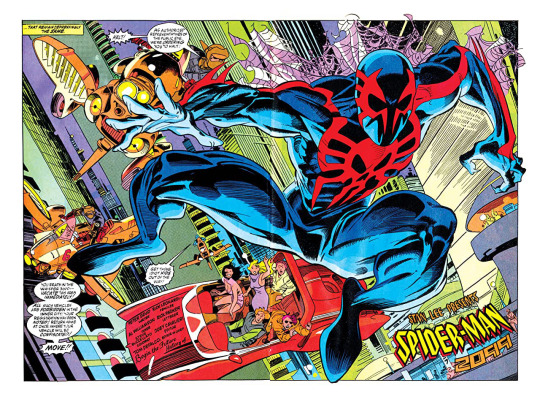
I feel like a lot of people forget today (as I suppose they inevitably tend to) that Ultimate Spider-man was once THE hottest Spider book on the market, and while reboots-featuring-a-teenage-peter-parker may be a dime a dozen today, it was a breath of fresh air in the year 2000. It’s easy to see why too, Bendis and Bagley work great together, and it didn’t hurt that Marvel spared no expense on the physical presentation of the book. Simply put, each issue looks sharp, from the digitally painted cardstock covers, to the glossy pages; this was a book with high production values, featuring top tier talent. No expense was spared in making sure the artists were featured in the best possible light.

One thing I’ve can’t help but notice is the differences in attitudes and ideals between the two books. I know a lot of people like to pretend that comics were less political ‘back in the day’ but that’s never been true. I do think that politics have sometimes been easier to ignore during times of less civil unrest, but clearly the writers have always had opinions and ideals that were being expressed whether they knew it or not. For instance, Peter David’s work on 2099 seems to lean more politically left, and is notably quite critical of nationalist, corporate, and capitalist interests, depicting a world that feels (in some ways) more relevant now than it was back when the series was being released.
Comparatively, Bendis’ writing seems to play it a bit safer. He appears largely progressive in his social views, but also less willing to criticize institutions like the military or government beyond anything on a surface level. I can’t say it’s too surprising, since ‘Ultimate Spider-man’ only began it’s run shortly before the 9/11 attacks, and I can imagine that even if he were inclined to do so, Bendis would have likely received pushback from anything deemed too politically controversial. But some of his writing leads me to suspect he falls towards a more politically centrist stance, resulting in a book that, while being LOADS of fun, has perhaps less to say on certain social issues. Some people might argue it’s for the best, but I kinda like it when writers are willing to get a bit messy, as I think it makes for more interesting discourse. But then again, maybe I’ll find myself eating these words as I continue my read through.
I think that’s enough musing from me. The fact remains that each of the artists I’ve discussed in this post are far more accomplished than I will likely ever be. At any rate these criticisms are really more just meandering observations, about which I could easily change my mind later on. Hopefully I’ll have more time to focus on my proper episode reviews in the coming months.
But if you’ve made it this far, thanks for hanging out.
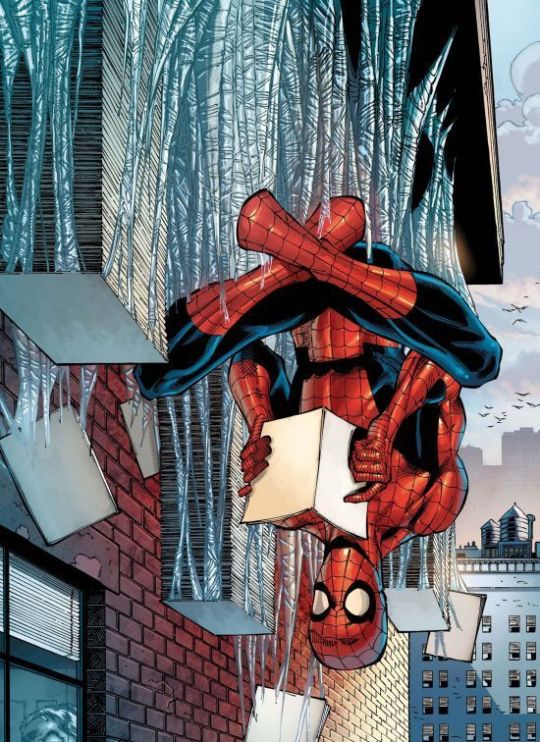
#reading break#spiderman#spiderman 2099#god emperor of dune#miguel ohara#peter parker#leto ii atreides#dune#sandworm#rick leonardi#mark bagley#MotaArt#patrick olliffe#the amazing spiderman#ultimate spiderman#comic books#dune part 2#sandworms#shai hulud#episodic nostalgia
7 notes
·
View notes
Text
Ranling ponderings on Frank Herbert, consequenctialsim, and Tolkien not caring for Dune
If Herbert was fascinated with world building by predicting consequences, the obvious power fantasy would be the perfect ability to predict consequences. The Mentats and Bene Gesserit could calculate consequences pretty well, but the Guild and Paul could perfectly predict consequences.
This becomes both a "superpower" and also a trap. Paul is able to easily exert power over the Guild because they perceive themselves as having no choice but to follow the only path that doesn't result in the consequences of Paul destroying the spice. He doesn't even need to voice his demands - they can perceive the consequences without even perceiving the power dynamics.
Of course, Herbert would further examine the trap of predicting consequences in Dune Messiah, where Paul himself is physically blinded and he can only move forward by obediently following his prescience vision (until he chooses not to … so he has some choice). And then the God Emperor Leto II would embark on a cruel and callous multi-thousand year project purely based on a prescient vision.
It's a huge trolley problem clusterfudge for consequentialists to sweat button meme over.
But that's not something I think would appeal to Tolkien. In his Catholicism influenced world view, prophecy is either true and Godly and good, or it's false and devilish and evil. The acts of Men and Elves aren't good or bad based strictly on their consequences, but whether they are borne out of goodness in one's heart or rot from inner corruption. The morality of TLotR revolves around Gandalf's evaluation of Bilbo sparing Gollum. Gandalf admits that he does not know the consequences, nor did Bilbo, but that should not be the only thing that matters!
I think that Tolkien would have seen Herbert's obsessive consequentialism as utterly removing the quintessential nature of what makes people more than just busybody robots struggling against each other to get ahead.
9 notes
·
View notes
Text
🌌 Exploring the Epic World of Dune by Frank Herbert 🌌
Today, let’s dive into the intricate and mesmerizing universe of Dune by Frank Herbert. This science fiction masterpiece is more than just a tale of politics and power; it's a richly woven tapestry of ecology, religion, and human ambition.
Why Dune is a Must-Read:
Complex Characters: From the enigmatic Paul Atreides to the fierce Fremen, each character is deeply developed and integral to the plot.
Intricate World-Building: Herbert’s creation of the desert planet Arrakis, with its unique ecosystem and spice economy, is nothing short of brilliant.
Themes of Power and Corruption: The struggle for control over the spice melange mirrors real-world issues of resource scarcity and political intrigue.
Philosophical Depth: Dune challenges readers to think about destiny, leadership, and the human condition in profound ways.
Whether you're a seasoned sci-fi aficionado or new to the genre, Dune offers an unforgettable journey that will leave you pondering long after you've turned the last page.
Have you read Dune?
#dune#dune part 2#dune part two#frank herbert#writing#reading#amreading#justread#just read#dune by frank herbert#dune novel
5 notes
·
View notes